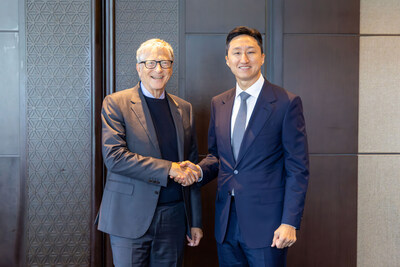URGENT UPDATE: HD Hyundai’s Executive Vice Chairman Chung Kisun met with TerraPower leadership, including chairman Bill Gates, in Seoul, South Korea, on August 22, 2025. This significant meeting comes just five months after their initial discussions in the U.S. and aims to accelerate the global nuclear supply chain for advanced energy solutions.
The leaders reviewed progress on the supply chain expansion and the commercialization of Natrium reactors, which are heralded for their cutting-edge technology and safety features. Chung emphasized the potential impact of their collaboration, stating, “This will mark a turning point in building a global nuclear supply chain and advancing the energy paradigm shift.”
In March, the two companies signed a memorandum of understanding (MOU) to enhance the global manufacturing supply chain for Natrium reactors, a pivotal step towards sustainable energy solutions. The Natrium reactors, classified as Generation IV small modular reactors (SMRs), utilize an innovative sodium-cooled fast reactor (SFR) design. They are recognized for their high thermal efficiency and generate approximately 40% less nuclear waste compared to traditional reactors.
HD Hyundai has secured a contract to supply the reactor vessels for the first Natrium reactor, showcasing its manufacturing prowess and commitment to the nuclear sector. Chris Levesque, President and CEO of TerraPower, remarked, “Partnering with HD Hyundai, we aim to accelerate commercialization of Natrium reactors and create global market opportunities.”
This collaboration is not just about improving supply chains; it holds the potential to reshape the energy landscape. As the world grapples with energy sustainability, technologies like the Natrium reactor are crucial. Chung Kisun described next-generation SMR technology as a core solution for a sustainable energy future.
In addition to the Natrium initiative, HD Hyundai is exploring the development of nuclear-powered vessels, further solidifying its role in the global nuclear industry. The advancements in molten salt reactor (MSR) technologies may provide additional applications for the shipbuilding sector.
The implications of this partnership extend beyond business; they represent a collective effort to address global energy challenges and reduce carbon footprints. As momentum builds around nuclear energy, stakeholders are watching closely to see how this collaboration unfolds.
Stay tuned for more updates as this story develops, and share this article to spread the word about this groundbreaking meeting in the quest for sustainable energy solutions.
